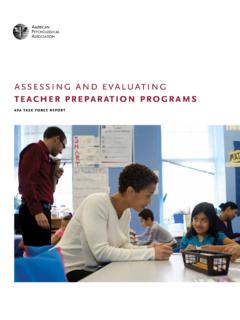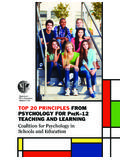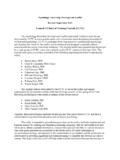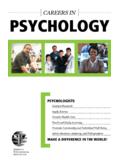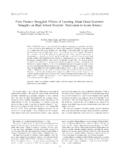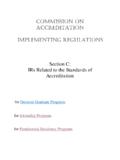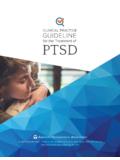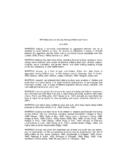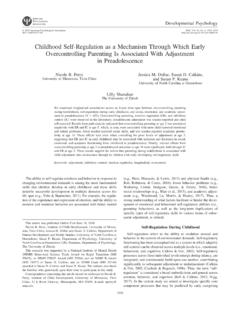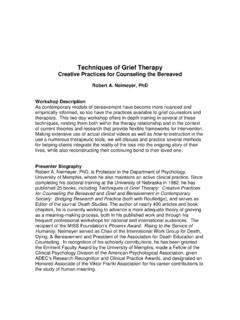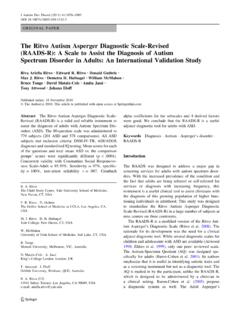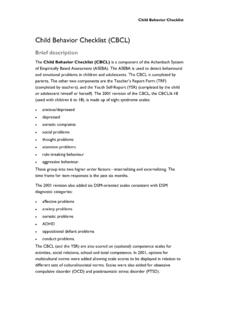Transcription of Effects of Music and Grade Consequences on Test Anxiety ...
1 Effects of Music and Grade Consequences on Test Anxiety andPerformanceJennifer L. Lilley, Crystal D. Oberle, and Jon G. Thompson, State UniversityThis research investigated the Effects of Grade Consequences and Music on test Anxiety and undergraduate participants (75% women, 25% men; mean age of years; 51% Caucasian,38% Hispanic, 4% African American) were instructed that their performance on a mathematics test eitherwould or would not affect their course credit. Afterward, they listened to either calm or obnoxious musicfor 5 min prior to the test. Anxiety was assessed with a self-report inventory, systolic blood pressure,diastolic blood pressure, and heart rate. Compared with those who listened to obnoxious Music , thosewho listened to calm Music had lower systolic blood pressure (p .01, 2 .08), lower heart rate (p .04, 2 .06), and higher test scores (p .01, 2 .11); however, the latter 2 Effects were onlysignificant for those whose course credit was threatened (p.)
2 05, 2 .05). Self-reported Anxiety (p .50, 2 .01) and diastolic blood pressure (p .79, 2 .01) were not significantly affected. Thesefindings suggest a benefit of relaxing Music for students experiencing test : Music , test performance, test Anxiety , heart rate, blood pressureMany undergraduate college students experience higher thannormal levels of Anxiety owing to a variety of stressors, includingthe academic demands of their studies, homesickness, alcohol,peer pressure, and a novel independent financial life ( , Butler,Dodge, & Faurote, 2010; Conley & Lehman, 2012; Hamaideh,2011; Verger et al., 2009). The current study will examine whetherlistening to calming Music lowers students Anxiety in Anxiety and Grade ConsequencesAnxiety is a human emotion that persists in reaction to fear,uncertainty, or threat in the environment. Several attempts toconceptualize and classify Anxiety have been primed, one of whichis the state trait function (Spielberger, 1972, 1983).
3 State anxietyis an acute reaction to a particular situation that appears to beuncertain or threatening, inducing stress on the individual. Traitanxiety refers to the permanent tendency to react with state anxietydue to anticipation of stressful events. Both of these classificationscan be further broken into hierarchal catalogs. One subset of thestate brand is test Anxiety , which encompasses Anxiety when underevaluation or in testing situations. This construct is a physiologicaland psychological response to concern over poor test performanceand its implications. Empirical literature advocates that test anxietynegatively affects student academic performance in high schooland college students through several methods. In particular, cog-nitive interference and worry caused by test Anxiety before exam-inations may lead to poor understanding of test material and studyhabits, as well as inhibit adequate performance during tests (Carden, Bryant, & Moss, 2004; Cassady & Johnson, 2002;Chapell et al.)
4 , 2005).Relieving AnxietyOne Anxiety -relieving strategy that is used universally in humannature is Music . The findings from research on the impact of musicin occupational settings revealed that a single Music relaxationsession decreased participants state Anxiety significantly, com-pared to a control group with no Music therapy (Smith, 2008).These results support the idea that Music can serve as a relaxationtool in occupational settings. Not only did participants have feel-ings of reduced tension but also a sense of pleasantness. Theresults support the idea that Music can help workers reduce anxietythat is normally associated with workplace environments. Thecalming effect of Music has a positive impact on a person s moodand quality of work, as well as an increase in perceived level ofrelaxation that may help the person focus on performance (Labbe,Schmidt, Babin, & Pharr, 2007; Lesiuk, 2005).
5 Music therapy has many demonstrated applications. Transplant(Madson & Silverman, 2010), Alzheimer s (Gu tin et al., 2009),and mechanical ventilation (Han et al., 2010) patients have all hada positive reaction to Music therapy. The Madison and Silvermanstudy measured Anxiety with verbalization from the patient as wella likert -type scale , and the Gu tin et al. study issued the HamiltonScale to assess the patients levels of Han et al. study used the State Trait Anxiety scale but alsoevaluated physiological measurements like respiratory rate, sys-tolic blood pressure (SBP), and heart rate (HR). HR and bloodpressure (Duan, Xiao, Zhao, & Zhu, 2008) have been shown to bephysiologic indices of Anxiety . Therefore, one could predict that ifanxiety were to be alleviated, so would the cardiovascular conse-quences. Numerous studies have shown that Music therapy canThis article was published Online First April 14, L.
6 Lilley, Crystal D. Oberle, and Jon G. Thompson, Jr. Depart-ment of Psychology, Texas State concerning this article should be addressed to CrystalD. Oberle, Department of Psychology, Texas State University, 601 Uni-versity Drive, San Marcos, TX 78666. E-mail: Music , Mind, and Brain 2014 American Psychological Association2014, Vol. 24, No. 2, 184 1900275-3987/14/$ DOI: such physiological measures as SBP and HR, as well asother negative Effects of Anxiety (Han et al., 2010; Knight &Rickard, 2001; Tse, Chan, & Benzie, 2005). Music and Cognitive PerformanceAdditional research on the positive Effects of Music has ex-plored its influence on cognitive performance. Many researchershave found that people perform better on spatial cognitive tasksafter listening to 10 min of Mozart than after sitting in silence ( ,Ho, Mason, & Spence, 2007; Ivanov & Geake, 2003; Jau ovec,Jau ovec, & Gerlic , 2006; Johnson, Shaw, Vuong, Vuong, &Cotman, 2002).
7 However, others have failed to find such a benefitof listening to Mozart ( , C rnc ec, Wilson, & Prior, 2006; Hui,2006; McKelvie & Low, 2002).The mediating effect of arousal has been supported by thefindings of several research studies. For instance, researchers havefound that performance was greater when the task was completedafter listening to the up-beat Mozart piece than after listening to arelaxation tape, as well as self-reported increases in arousal afterlistening to a fast-tempo piece and self-reported decreases inarousal after listening to a slow-tempo piece (Husain, Thompson,& Schellenberg, 2002; Schellenberg, Nakata, Hunter, & Tamoto,2007; Thompson, Schellenberg, & Husain, 2001). Furthermore,when the arousal level is statistically covaried, the Mozart effectdisappears (Jones & Estell, 2007; Jones, West, & Estell, 2006).Thus, arousal, rather than the Music per se, seems to best predictcognitive this idea to academic performance, relevant to thestudents arousal level is test Anxiety .
8 Based on the classic psy-chological arousal performance relationship (Yerkes & Dodson,1908), performance will be greatest when the performer experi-ences a moderate level of arousal. Thus, if students are especiallyanxious about a test due to the Grade Consequences , listening tofast-tempo, obnoxious Music prior to the test may increase theiralready-heightened arousal level, leading to relatively poor perfor-mance on the test. On the other hand, listening to slow-tempo,calm Music prior to the test may lower their arousal to a moreoptimal level, leading to relatively greater performance on the of the Current StudyThe current study evaluates the interactive Effects of gradeconsequences and Music on Anxiety (assessed with physiologicaland self-report measures) and academic test performance. What isunique about this research is that the pairing of both factors allowsinvestigation of how induced or relieved Anxiety affects scholasticperformance in a controlled, but ecologically valid, Grade Consequences , students are given informationfrom their professors that can either increase or decrease their stateanxiety and self-efficacy, both of which may impact test perfor-mance (Kesici, Erdog an, & Kelesoglu, 2009).
9 Essentially, greaterdemands relate to greater negative Effects (Chambel & Curral,2005). The prediction is that students who are instructed to simplytry their best and not worry about a test will be optimistic,experience less Anxiety , and perform relatively well on the test. Incontrast, greater Anxiety and poorer performance may result whenstudents are warned that the test will be difficult and that theirperformance is critical to their Grade in the Music , many students may study in the presence ofmusic, and the type of Music may affect their Anxiety levels andacademic performance. The prediction is that obnoxious Music (inthis study, fast-tempo Music with sharply changing metal tones)will increase students Anxiety and negatively affect testing per-formance owing to the excessively high arousal level, whereascalm Music (in this study, slow-tempo Music with soothing instru-mental tones) will decrease students Anxiety to an optimal leveland positively affect testing performance.
10 Furthermore, an inter-action between Grade Consequences and Music is expected. Forexample, threatening students grades may increase Anxiety , whichmay be either further increased with obnoxious Music or decreasedto normal levels with calm participants included 80 undergraduate students, 60 womenand 20 men, ranging from ages 17 to 26 (M ,SD ).These students represented a variety of majors that were mostlyrecruited from the general-education introductory psychologyclasses at Texas State University. The majority of participantswere Caucasian (51%), with the remaining sample being Hispanic(38%), African American (4%), or of another ethnic origin (7%).Prior to participation, the participants were given informationabout the basic procedures involved in the study, but to minimizepotential bias, they were not informed of the specific manipula-tions or hypotheses under this study, which was conducted in a small andwindowless laboratory room, the participants Anxiety was as-sessed with three physiological measures and one self-report mea-sure.
